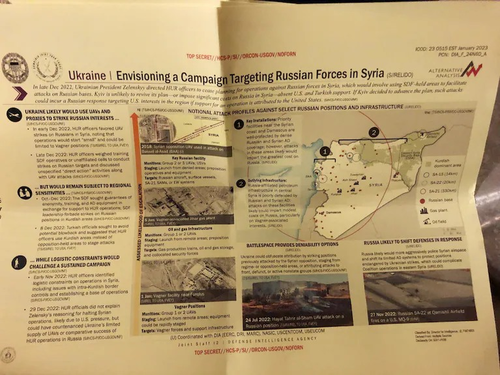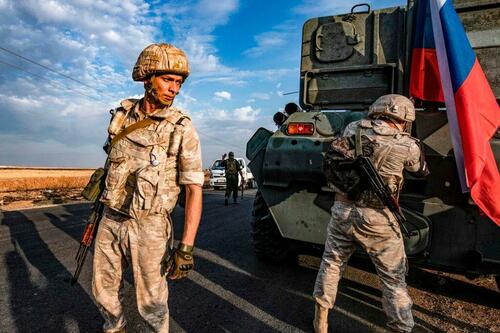
Authored by Kyle Anzalone via AntiWar.com,
Kiev’s military intelligence agency believed it could carry out attacks on Russian soldiers and Wagner Group forces in Syria, forcing Moscow to redeploy military assets from Ukraine. The story was reported by the Washington Post using documents released by Jack Teixeira.
The Ukrainian defense officials believed they could use Kurdish forces to wage a proxy war against Russia in Syria. According to the Post, the plan never materialized as President Volodymyr Zelensky ordered an end to the planning in December.
It appears that Ukrainian officials engaged in some discussions with the Syrian Democratic Forces, a Kurdish militia backed by the US. The documents said the Kurdish officials requested training on drones and air defenses. Additionally, the Kurds said they would not attack Russian positions in areas held by the SDF, and requested their role in the operations be kept secret.
Ukraine declined to respond to questions about the document. A Kurdish official claimed the information was false.
Russian forces have been in Syria since 2015. President Vladimir Putin ordered his soldiers to aid the Syrian government led by Bashar al-Assad. At the time of Russian intervention, both al-Qaeda in Syria and ISIS were threatening to topple Damascus. The Russian soldiers helped Syrian forces turn back the advance of the jihadist groups.
While Moscow continues military operations in Syria, the Kremlin is attempting to end the conflict through diplomatic means. Putin is attempting to broker a deal to normalize relations between Syria and Saudi Arabia. Riyadh has been a primary backer of the anti-Assad militants in Syria and has received pressure from Washington to continue to isolate Damascus.
The document says Zelensky could allow the operations to proceed, but would likely require assistance from the US and Turkey. Ankara may be unwilling to support the covert proxy warfare as it views the SDF as a terrorist organization, and has long protested Washington arming the Syrian Kurds.
Additionally, the operations could inflame the war in Syria. The decade-long war has seen a dip in violence in recent years as Assad and his allies have consolidated control over most of Syria. The US and SDF occupy the eastern third of the country.

However, the SDF leadership has shown a willingness to work with Moscow. If Kurdish forces allow themselves to become a proxy force for Kiev, Moscow will likely aggressively target SDF positions in eastern Syria.
Authored by Kyle Anzalone via AntiWar.com,
Kiev’s military intelligence agency believed it could carry out attacks on Russian soldiers and Wagner Group forces in Syria, forcing Moscow to redeploy military assets from Ukraine. The story was reported by the Washington Post using documents released by Jack Teixeira.
The Ukrainian defense officials believed they could use Kurdish forces to wage a proxy war against Russia in Syria. According to the Post, the plan never materialized as President Volodymyr Zelensky ordered an end to the planning in December.
It appears that Ukrainian officials engaged in some discussions with the Syrian Democratic Forces, a Kurdish militia backed by the US. The documents said the Kurdish officials requested training on drones and air defenses. Additionally, the Kurds said they would not attack Russian positions in areas held by the SDF, and requested their role in the operations be kept secret.
Ukraine declined to respond to questions about the document. A Kurdish official claimed the information was false.
Russian forces have been in Syria since 2015. President Vladimir Putin ordered his soldiers to aid the Syrian government led by Bashar al-Assad. At the time of Russian intervention, both al-Qaeda in Syria and ISIS were threatening to topple Damascus. The Russian soldiers helped Syrian forces turn back the advance of the jihadist groups.
While Moscow continues military operations in Syria, the Kremlin is attempting to end the conflict through diplomatic means. Putin is attempting to broker a deal to normalize relations between Syria and Saudi Arabia. Riyadh has been a primary backer of the anti-Assad militants in Syria and has received pressure from Washington to continue to isolate Damascus.
The document says Zelensky could allow the operations to proceed, but would likely require assistance from the US and Turkey. Ankara may be unwilling to support the covert proxy warfare as it views the SDF as a terrorist organization, and has long protested Washington arming the Syrian Kurds.
Additionally, the operations could inflame the war in Syria. The decade-long war has seen a dip in violence in recent years as Assad and his allies have consolidated control over most of Syria. The US and SDF occupy the eastern third of the country.

However, the SDF leadership has shown a willingness to work with Moscow. If Kurdish forces allow themselves to become a proxy force for Kiev, Moscow will likely aggressively target SDF positions in eastern Syria.
Loading…





